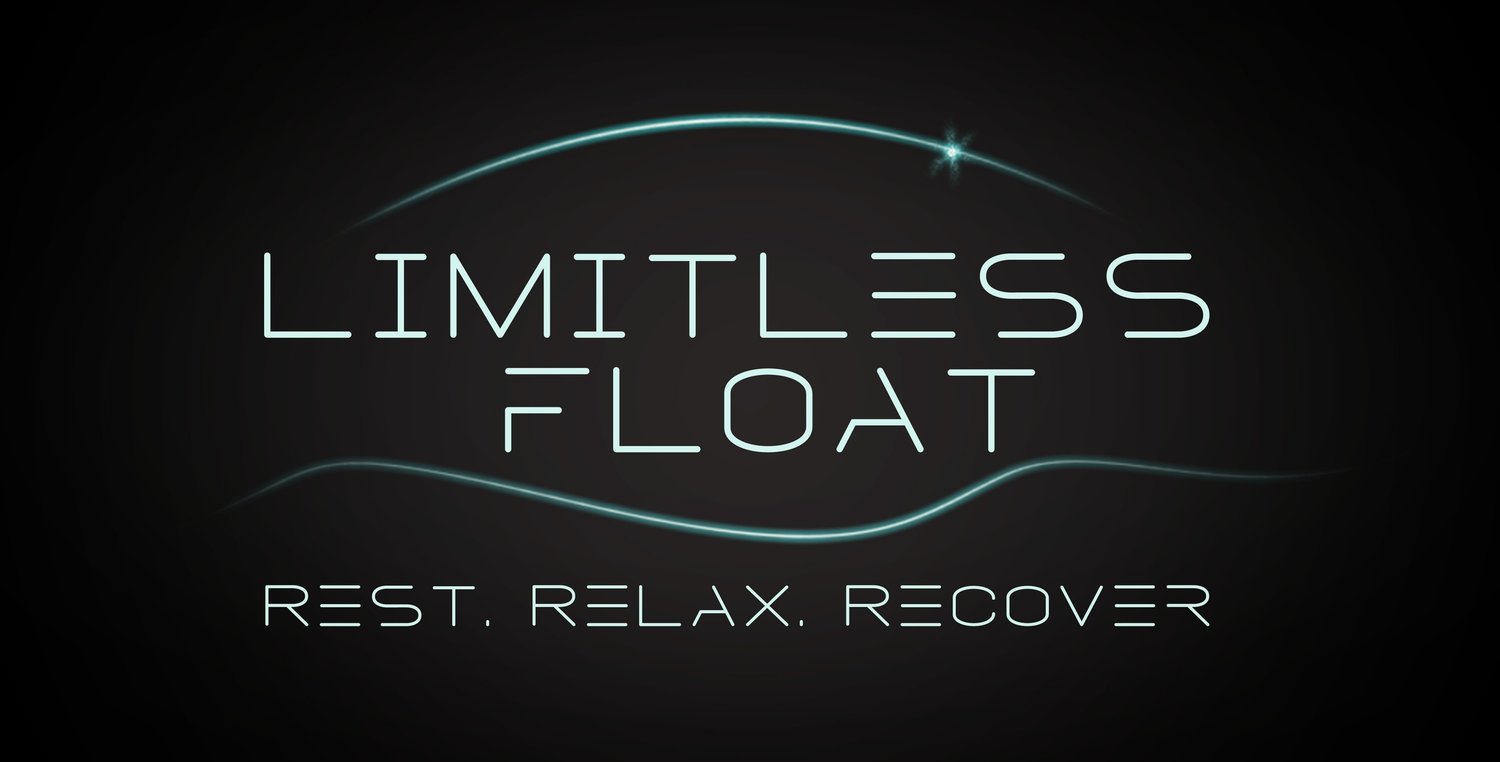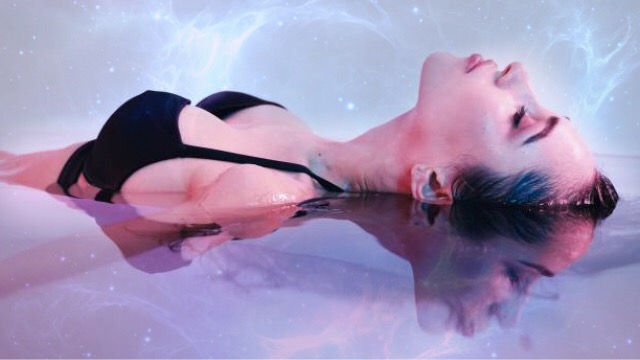+ STRESS RELIEF, ANXIETY, DEPRESSION & PTSD
Floatation reduces distraction, by creating a safe environment cut off from the world where it is otherwise difficult to find refuge. This creates a deep relaxation that can't be found anywhere else but in the float tank. With 90% of gravity off your body and very little sensory input, your body is able to decrease the release of cortisol (stress hormone) and lower blood pressure which is linked to elevated stress and increased risk for chronic illnesses and depression. The deep meditative state achieved during floatation therapy is a suggested reason for this increased level of happiness which elevate levels of dopamine and endorphins. A recent study showed these effects were apparent after a single, one hour float and, in anxiety, even rivalled the use of prescription medication (1). These benefits also last past the float sessions with increased use, up to six months later according to a study conducted in 2016. (2). Although there are limited studies on flotation therapy for the direct treatment of PTSD, the most recent in 2018 (1) showed a decrease in symptoms. There are multiple studies (3,4) which have shown that meditation practice, float tanks providing the ultimate environment for, combined with traditional therapy can improve the severity of PTSD symptoms. Due to quiet nature of the tank it prevents sudden attacks of fear and subsequent reactions related to noise and allows the mind to feel rested and calm.
- Examining the short-term anxiolytic and antidepressant effect of Flo[atation-REST Justin S. Feinstein, Sahib S. Khalsa, Hung-wen Yeh, Colleen Wohlrab, W. Kyle Simmons, Murray B. Stein, Martin P. Paulus. PLoS One. February 2018
- Promising effects of treatment with flotation-REST (restricted environmental stimulation technique) as an intervention for generalized anxiety disorder (GAD): a randomized controlled pilot trial. Jonsson K, Kjellgren A. BMC Complementary Alternative Medicine, March 2016.
- Transcendental Meditation in the Treatment of Post-Vietnam Adjustment. James S. Brooks, Thomas Scarano. Journal of Counseling & Development, November 1985.
- Meditation-based mantram intervention for veterans with posttraumatic stress disorder: A randomized trial. Jill E. Bormann; Steven R. Thorp; Julie L. Wetherell; Shahrokh Golshan; Ariel J. Lang. Psychological Trauma: Theory, Research, Practice, and Policy, May 2013.
+ MUSCLE TENSION, CHRONIC PAIN & HEADACHES
Stress isn’t just a mind thing, it affects our bodies by causing muscle tension and strain. Floating allows your body to escape the sensation of gravity, and allows your body to elongate your spine and restore your primal body posture and joint mobility. This leads to a substantial decrease in stress-related pain (1) as the mind and body are treated at once. Participants in a study with neck and back aches reported significantly reduced pain intensity after floating (2). Chronic pain can affect our quality of life. Sometimes pain is so debilitating that even what would be considered a simple task is near impossible. Work, social events and even spending time with family and friends can be a painful pastime and may result in the addition of depression. Floating has been shown to reduce symptoms of osteoarthritis and rheumatoid arthritis (3), fibromyalgia (4), MS and more. Migraines can be disabling and are 3 times more common in women than men. Floating may initially help with the blackout and serenity, decreasing any stimuli. By then relaxing into the water further tension may be released from your head, neck and shoulders. It has been proven that there is a link between low magnesium levels and migraines (5). Unfortunately most of us have a deficiency due to depleted magnesium levels in our soil and food, add general stress into the equation and your levels drop further. By floating in the rich magnesium based Epsom Salt, you will ultimately absorb magnesium and replenish the vital nutrient to aid and potentially decrease any further attacks.
- Eliciting the relaxation response with the help of flotation-rest (restricted environmental stimulation technique) in patients with stress-related ailments. Bood, Sven Å.; Sundequist, Ulf; Kjellgren, Anette; Norlander, Torsten; Nordström, Lenneart; Nordenström, Knut; Nordström, Gun. International Journal of Stress Management, May 2006.
- Effects of flotation-REST on muscle tension pain. Kjellgren A1, Sundequist U, Norlander T, Archer T. Pain Research Management, Winter 2001.
- Effects of flotation REST on range of motion, grip strength and pain in rheumatoid arthritics. John TurnerJr., Anna DeLeon, Cathy Gibson, Thomas Fine. Clinical and Experimental Restricted Environmental Stimulation, January 2005.
- http://fibromyalgiaflotationproject.com/
- Relation between serum magnesium level and migraine attack. Talebi M1, Savadi-Oskouei D, Farhoudi M, Mohammadzade S, Ghaemmaghamihezaveh S, Hasani A, Hamdi A. Neurosciences (Riyadh). October 2011
+ SPORTS RECOVERY & PERFORMANCE
Floating is a revolutionary tool for enhancing the recovery, rejuvenation and performance of your body. When you value the time you put into your goals at the gym or for an event, everything you do counts. Floating helps to speed recovery after peak output and helps decrease fatigue and post adrenaline. It can also help focus the mind before an event. Pro MMA fighter Tom ‘Kong’ Watson knows first hand the tolls training and mental preparation can have on the body: ‘Training at elite level puts a huge strain on the body, recovery is paramount so that I'm ready for the next session. Floatation is by far one of the best recovery methods I have encountered in my 18 years training in MMA. As important as it is for me to be physically in shape I also need to be mentally sharp. Floatation helps me visualise all the physical elements before a fight so I can be mentally prepared.’ It’s not just pro athletes that need recovery tools, stepping into a gym for your weekly workout can cause tension, strain and injury. A study (1) showed that floatation can help reduce lactic acid after exercise which causes muscle pain and cramps. Quicker recovery equals better physical performance. Floating is the ultimate form of rest which produces a mental state where your learning abilities are at their highest and powers of visualisation and auto-suggestion are greatly enhanced as our brains revert to ‘default mode’. It is suggested that the brain enters an extended ‘theta state’ which can be used as a tool for enhanced creativity and problem solving or super learning. By cutting out external stimuli and allowing our minds to rest as they should, the mind is able to absorb new material deeply, with research (3, 4) showing improved performance in memory, creativity, problem solving and recall activities.
- The Acute Effects of Flotation Restricted Environmental Stimulation Technique on Recovery From Maximal Eccentric Exercise, Journal of Strength & Conditioning Research, December 2013.
- Floatation REST and Imagery in the Improvement of Athletic Performance, Journal of Sport & Exercise Psychology, 1990.
- The effect of the floatation version of Restricted Environmental Stimulation Technique (REST) on jazz improvisation. Oshin Vartanian, Peter Suedfeld. Music and Medicine, May 2011.
- Creativity enhancement through floatation isolation. Donald G. Forgays, Deborah K. Forgays. Journal of Environmental Psychology, December 1992.
+ PREGNANCY
Pregnancy is a blessing and although we are grateful to be carrying a new life it isn’t without its difficulties. Morning sickness, bloating, headaches early on progress to muscle strain, soreness and puffiness. Towards the end even the simple task of turning in your sleep can cause extraordinary pain. You are then left with exhaustion, and that’s before the night feeds. It’s always recommended to consult your doctor first, to make sure floating when pregnant is suitable for you and to discuss any specific health conditions, however once you have the green light it can offer a wealth of pain-relieving and relaxation benefits, especially in the late second and third trimesters. The temperature of the water is set to 35°c which is within the recommendations advised by the NHS, so like a warm bath not like a hot tub. The float tank creates a nurturing, quiet environment where you and the baby can enjoy time to bond as the feeling of movement is likely enhanced. If you were fortunate enough to sail through pregnancy then after birth maybe a different story. Floating can give you some much needed time out to relax, recover and recharge from the birth and your new sleep schedule, and we know how important sleep is to the mind and body (1). Let’s not forget that being calm around baby reflects on them and you may find they settle easier, meaning you may get even more sleep!
Are you looking for a gift to give for a baby shower or after the birth? A gift card is a truly unique present that we’re sure any expectant or new mother would appreciate, see our prices & packages page for gift cards.
- E. Ballard. REST in the treatment of persistent psychophysiological insomnia. A.F. Barabasz, M. Barabasz (Eds.), Clinical and experimental restricted environmental stimulation, Springer-Verlag, New York (1993), pp. 187-203

